Middle East
Iraq look to former Australia coach Arnold to boost 2026 World Cup hopes | Football News
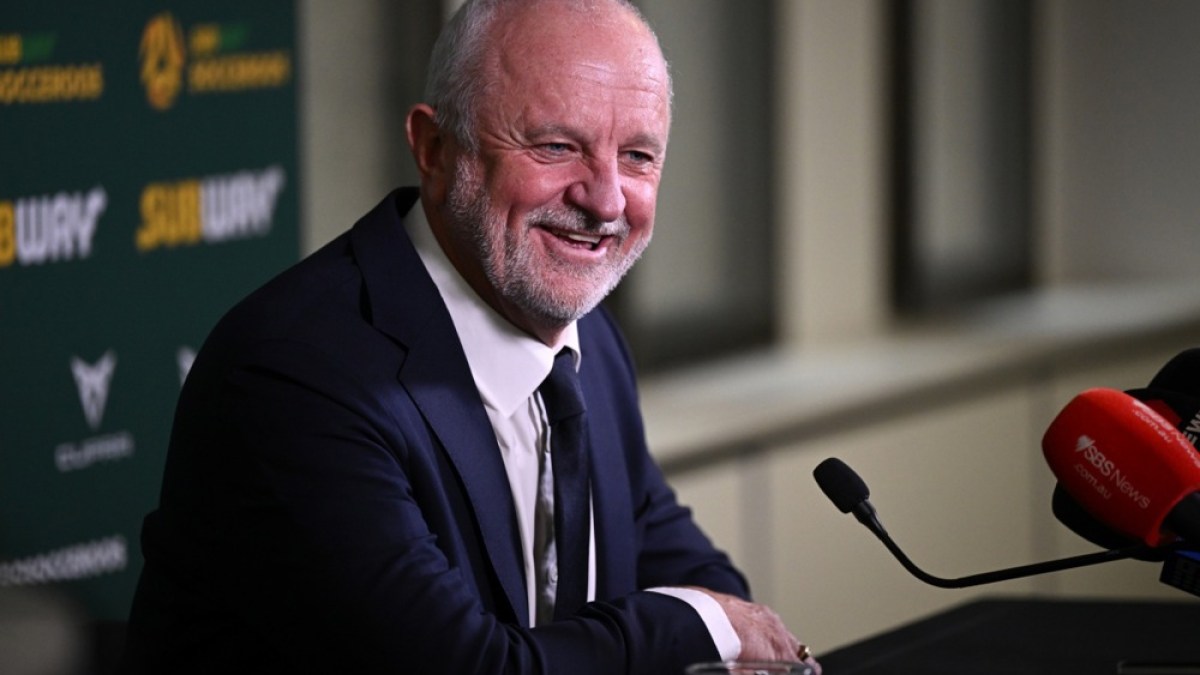
Iraq replaces Jesus Casas as head coach with former Australia boss Graham Arnold ahead of crunch World Cup qualifiers.
Former Australia manager Graham Arnold has been confirmed as the new head coach of Iraq by the country’s football federation ahead of next month’s World Cup qualifiers against South Korea and Jordan.
Arnold’s appointment was announced on social media by the Iraq Football Association, which published photographs of the 61-year-old being welcomed in Baghdad by officials from the national body.
“We are delighted to announce Graham Arnold as the new head coach of the Iraq national team,” the federation said in a post on Instagram. “Welcome to the Lions of Mesopotamia!”
Arnold replaces Jesus Casas at the helm after the Spaniard’s departure in the wake of a 2-1 loss to Palestine in March during the third round of Asia’s qualifiers for the 2026 World Cup.
That result left the Iraqis in third place in the standings in Group B, four points adrift of leaders South Korea and one behind the Jordanians.
Welcome to Baghdad ✔️
Our new Australian head coach Graham Arnold has arrived in the Iraqi capital! 🛬 pic.twitter.com/AH1IybroHv
— Iraq National Team (@IraqNT_EN) May 9, 2025
The top two finishers in each of Asia’s three qualifying groups advance automatically to the World Cup, while the teams in third and fourth place progress to another round of preliminaries.
Arnold’s first game in charge will be in Basra on June 5 against the South Koreans before he takes his new team to Amman to face Jordan five days later. Iraq are attempting to qualify for the World Cup for the first time since 1986.
The appointment sees Arnold return to international management more than seven months after standing down as Australia’s head coach.
Arnold, who led the Australians to the knockout rounds of the 2022 World Cup during a six-year spell in charge, quit after an uninspired start to the current phase of qualifying when his side lost to Bahrain and drew with Indonesia in September.
He was replaced by Tony Popovic, the former Western Sydney Wanderers coach who has taken the Socceroos to second place in Group C of Asia’s qualifiers ahead of games against already qualified Japan and Saudi Arabia in June.
Middle East
At least 33 people killed in suspected RSF attacks in Sudan | Sudan war News
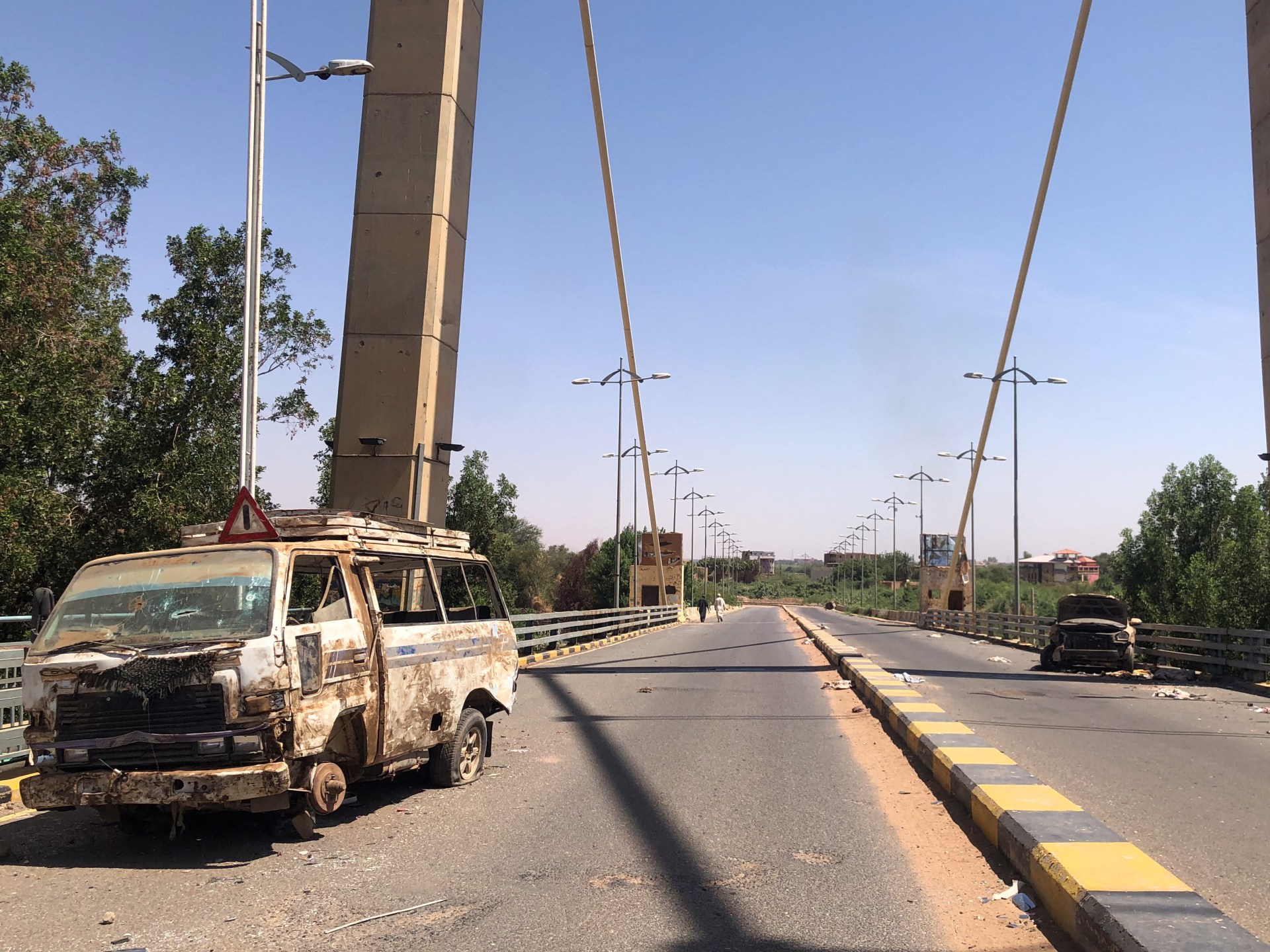
The paramilitary force has been blamed for attacks on a prison in el-Obeid and a displacement camp in Darfur.
At least 33 people have been killed in Sudan in attacks suspected to have been carried out by the paramilitary Rapid Support Forces (RSF) as the brutal two-year war claims its latest victims.
An RSF strike on a prison on Saturday in el-Obeid killed at least 19 people, while on Friday evening, at least 14 members of the same family were killed in an air attack in Darfur, local sources said.
The attacks – part of the RSF’s ongoing war with the military-led government’s Sudanese Armed Forces (SAF) since 2023 – came after six straight days of the paramilitary group’s drone attacks on the army-led government’s wartime capital of Port Sudan.
These attacks damaged key infrastructure, including a power grid and the country’s last operational civilian airport, which was a key gateway for aid into the war-ravaged nation.
The war has left tens of thousands dead, displaced 13 million people and triggered what the United Nations calls the world’s worst humanitarian crisis.
The attack on the prison on Saturday also wounded 45 people, a medical source told the AFP news agency. The source said the jail in the army-controlled city in the North Kordofan state capital was hit by an RSF drone.
The night before, 14 people were killed at the Abu Shouk displacement camp near el-Fasher in Darfur, a rescue group said, blaming the paramilitary.
The camp “was the target of intense bombardment by the Rapid Support Forces on Friday evening”, said the group of volunteer aid workers.
The camp near el-Fasher, the last state capital in Darfur still out of the RSF’s control, is plagued by famine, according to the UN.
It is home to tens of thousands of people who fled the violence of successive conflicts in Darfur and the conflict that has been ripping Africa’s third-largest country asunder since 2023.
The RSF has shelled the camp several times in recent weeks.
Abu Shouk is located near the Zamzam camp, which the RSF seized in April after a devastating offensive that virtually emptied it.
RSF escalation
Elsewhere on Saturday, SAF warplanes struck RSF positions in the Darfur cities of Nyala and el-Geneina, destroying arms depots and military equipment, a military source told AFP.
The RSF has recently said it had taken the strategic town of al-Nahud in West Kordofan, a key army supply line to Darfur.
The RSF’s escalation in Port Sudan earlier this month came after the military struck the Nyala airport in South Darfur, where the RSF receives foreign military assistance, including drones. Local media stated that dozens of RSF officers were killed in the attack.
Sudan’s army-aligned authorities accuse the United Arab Emirates of supplying those drones to the RSF, which has no air force of its own.
The war began as a power struggle between SAF chief Abdel Fattah al-Burhan and his former deputy, RSF commander Mohamed Hamdan Dagalo. It has effectively divided the country into two, with the army controlling the north, east and centre, while the RSF and its allies dominate nearly all of Darfur in the west and parts of the south.
Both sides have been accused of committing war crimes.
Middle East
Iran’s FM visits Saudi Arabia, Qatar before nuclear talks with US in Oman | Politics News

The Iranian Ministry of Foreign Affairs has confirmed there will be a technical delegation at the Iran-US talks in Oman on Sunday.
Iran’s Foreign Minister Abbas Araghchi has visited Saudi Arabia and is due to visit Qatar for consultations in the run-up to the fourth round of indirect nuclear talks with the United States, which will take place in Oman on Sunday.
The future direction of Iran’s nuclear programme, its enrichment of uranium, and sanctions relief remain the key issues.
Araqhchi’s Gulf tour on Saturday comes after Tehran confirmed the latest round Friday: “The negotiations are moving forward, and naturally, the further we go, the more consultations and reviews are needed,” Araghchi said in remarks carried by Iranian state media.
Omani Foreign Minister Sayyid Badr Albusaidi said on Friday that, after “coordination with both Iran and the US”, the delayed talks would go ahead in Muscat. The fourth round, initially scheduled for May 3 in Rome, was postponed for what Oman described as “logistical reasons.”
A source familiar with the matter said on Friday that US President Donald Trump’s special envoy, Steve Witkoff, plans to attend the meeting in Oman.
Ongoing dispute over nuclear programme
The talks come against the backdrop of a long-running dispute over Iran’s nuclear ambitions. The meeting is the latest effort to revive diplomacy after years of rising tensions.
Successive US administrations have sought to prevent Iran from acquiring a nuclear weapon. A sustained effort by world powers during the Barack Obama administration culminated with a 2015 agreement called the Joint Comprehensive Plan of Action (JCPOA).
The multilateral agreement created a framework for Iran to receive much-needed relief from international sanctions, in exchange for reducing its uranium enrichment and submitting to inspections of its nuclear facilities.
But when Trump succeeded Obama as US president, he unilaterally withdrew the US from the nuclear agreement in 2018, causing the deal to crumble.
Some Western countries argue that Iran’s programme, accelerated after the US walkout from the 2015 accord, is aimed at developing weapons. Tehran maintains that its nuclear activity is entirely civilian.
Trump himself has acknowledged tensions in his policy on Iran, saying at the start of his second term that hawkish advisors were pushing him to step up pressure reluctantly.
In an interview on Thursday, Trump said he wanted “total verification” that Iran’s contested nuclear work is shut down, but through diplomacy.
“I’d much rather make a deal” than see military action, Trump told the conservative radio talk show host Hugh Hewitt.
“There are only two alternatives – blow ’em up nicely or blow ’em up viciously,” Trump said.
In an interview with Breitbart News on Friday, Witkoff said the US would “take [Iran] at their word” that they do not want nuclear weapons, but set out specific conditions for verifying such a position.
“If that’s how they feel, then their enrichment facilities have to be dismantled. They cannot have centrifuges. They have to downblend all of their fuel that they have there and send it to a faraway place — and they have to convert to a civil programme if they want to run a civil programme,” he said.
US Secretary of State Marco Rubio earlier raised the possibility of Iran importing enriched uranium for any civilian energy.
Iran’s Gulf outreach
Araqchi’s trips to Saudi Arabia and Qatar on Saturday are part of what he describes as “continuous consultations” with neighbouring states.
He said the visits aimed to address “concerns and mutual interests” regarding the nuclear issue.
Iranian Foreign Ministry spokesperson Esmail Baghaei confirmed the presence of a technical delegation in the talks in Oman on Saturday.
In an interview with Mehr News, Baghaei stated that the Iranian delegation is comprised of experts and specialists relevant to the current phase of the negotiations. He did not comment on the US team.
Middle East
My nephew asks if he will eat meat only in heaven. I struggle to answer | Israel-Palestine conflict
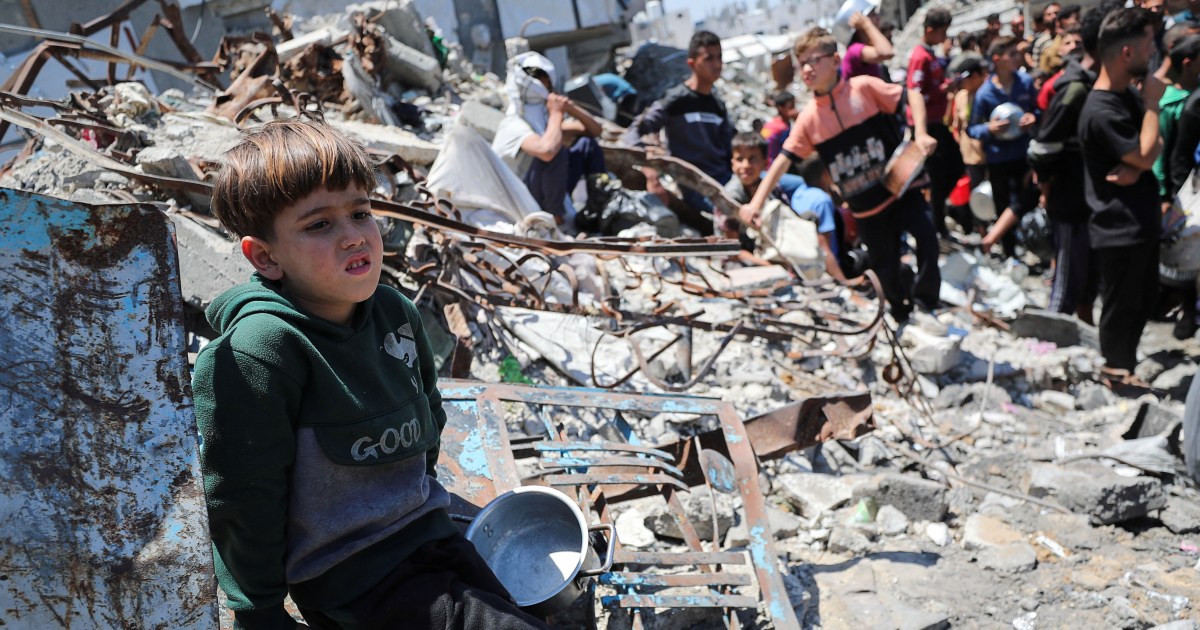
When on March 2, we heard all crossings into Gaza were closed, we thought it would not last more than two weeks. We really wanted a normal Ramadan where we could invite our surviving relatives for iftar and not worry about what food we could find to break our fast.
But it did not turn out this way. We spent the holy month breaking our fast with canned food.
My family, like most families in Gaza, had not stocked up on food or essentials, as no one expected the crossings to close again, or the famine – or even the war – to return.
In the days after the closure, food and other basic goods disappeared from the markets, and prices skyrocketed. A kilogramme of any vegetable jumped to $8 or more, sugar $22 and baby formula $11. A sack of flour previously costing $8, went up to $50; within two months, it reached $300.
Most people in Gaza could not afford these prices. As a result, families, including my own, began reducing the number of meals they eat, limiting themselves to just breakfast and dinner, and shrinking each person’s portion – half a loaf of bread for breakfast a whole one for dinner. Men, women, elderly people and children would stand in front of bakeries and charity kitchens for hours, in shame and sorrow, just to get a few loaves of bread or a small plate of food. For some families, this would be their only food for the day.
All the residents of central Gaza, where I live, relied on only three bakeries: two in Nuseirat and one in Deir el-Balah.
The crowds at these bakeries were overwhelming, blocking roads and halting movement in the area. Every day, there were cases of fainting and suffocation due to the pushing and shoving. In the end, only a small number of those who waited since morning would get bread.
My father would go to the bakery before sunrise to line up, instead of using what’s left of our flour, because we did not know how long this situation would last. But he would find the line already long, dozens having slept outside the bakery. He would stay until noon, then send my brother to take his place in the line. In the end, they would return with nothing.
On March 31, the World Food Programme announced the closure of all of its bakeries, including the three we could access, due to the depletion of flour and the lack of gas needed to run the ovens. This marked the start of true famine.
Soon, charity kitchens started closing as well because they ran out of food stock. Dozens of them shuttered in the past week alone. People grew even more desperate, many taking to local groups on Facebook or Telegram to beg for anyone to sell them a bag of flour at a reasonable price.
We live in a “lucky” neighbourhood where the kitchen still functions.
My niece Dana, who is eight years old, lines up in front of it every day with her friends, waiting for her turn as if it were a game. If she receives a single scoop of food, she comes back running, feeling very proud of herself. And if her turn doesn’t come before the food runs out, she returns in tears, complaining about how unfair this world is.
One day during Ramadan, a boy, displaced with his family to the al-Mufti School near our home, was so desperately trying to get food that he fell into the pot of hot food the charity kitchen was cooking. He suffered severe burns and later died from them.
The signs of famine began becoming apparent everywhere about a month and a half after the closure of the crossings. We see them in every aspect of our lives – sleeping on an empty stomach, rapid weight loss within, pale faces, weak bodies. Climbing stairs now takes us twice the effort.
It has become easier to get sick and more difficult to recover. My nephews, 18-month-old Musab and two-year-old Mohammed, developed high fever and flu-like symptoms during Ramadan. It took them a whole month to get better because of the lack of food and medicine.
My mother has been suffering from severe vision loss due to complications after eye surgery she had in late February. The malnutrition and the lack of eye drops she needed to recover have made her condition much worse.
I myself have been unwell. I donated blood to al-Awda Hospital in Nuseirat just days before the border was closed and this seriously affected my physical health. Now, I suffer from extreme weakness in my body, weight loss and difficulty focusing. When I went to the doctor, he told me to stop eating canned food and to eat more fruit and meat. He knew that what he was saying was impossible to do, but what else could he say?
Perhaps the most difficult part about this situation is having to explain famine to little children. My nieces and nephews cannot stop asking for things to eat that we simply cannot provide. We struggle to convince them that we are not punishing them by hiding food, but that we simply do not have it.
Five-year-old Khaled keeps asking for meat every day while looking at food pictures on his mother’s phone. He stares at the images and asks whether his martyred father gets to eat all this in heaven. Then he asks when his own turn will come, to join his father and eat with him.
We struggle to answer. We tell him to be patient and that his patience will be rewarded.
I feel helpless seeing daily scenes of famine and desperation. I ask myself, how can the world stay silent while seeing children’s bodies go thin and fragile and the sick and injured die slowly?
The occupation uses every method to kill us – by bombing, starvation, or disease. We have been reduced to begging for a piece of bread. The entire world watches and pretends that it cannot even give us that.
The views expressed in this article are the author’s own and do not necessarily reflect Al Jazeera’s editorial stance.
-
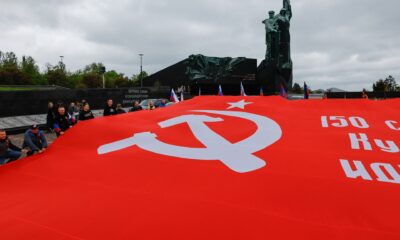
 Conflict Zones2 days ago
Conflict Zones2 days agoRussia-Ukraine war: List of key events, day 1,170 | Russia-Ukraine war News
-
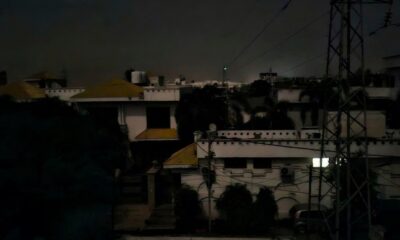
 Conflict Zones2 days ago
Conflict Zones2 days ago‘Missiles in skies’: Panic in Indian frontier cities as war clouds gather | India-Pakistan Tensions News
-

 Europe2 days ago
Europe2 days agoUkrainians on front line say Russians keep breaking Putin’s ceasefire
-
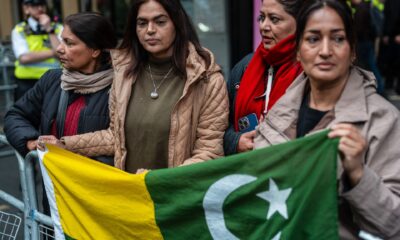
 Conflict Zones1 day ago
Conflict Zones1 day agoWho are the armed groups India accuses Pakistan of backing? | Armed Groups News
-
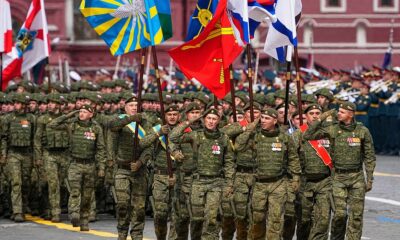
 Africa1 day ago
Africa1 day agoRussia stages massive victory day parade, Putin hails troops in Ukraine as foreign leaders attend
-
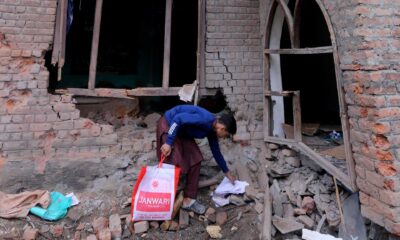
 Conflict Zones1 day ago
Conflict Zones1 day ago‘Slippery slope’: How will Pakistan strike India as tensions soar? | India-Pakistan Tensions News
-

 Europe1 day ago
Europe1 day agoUkraine’s Western allies pile pressure on Putin, threatening sanctions if he refuses 30-day truce
-

 Lifestyle1 day ago
Lifestyle1 day agoTwo dolls instead of 30? Toys become the latest symbol of Trump’s trade war




